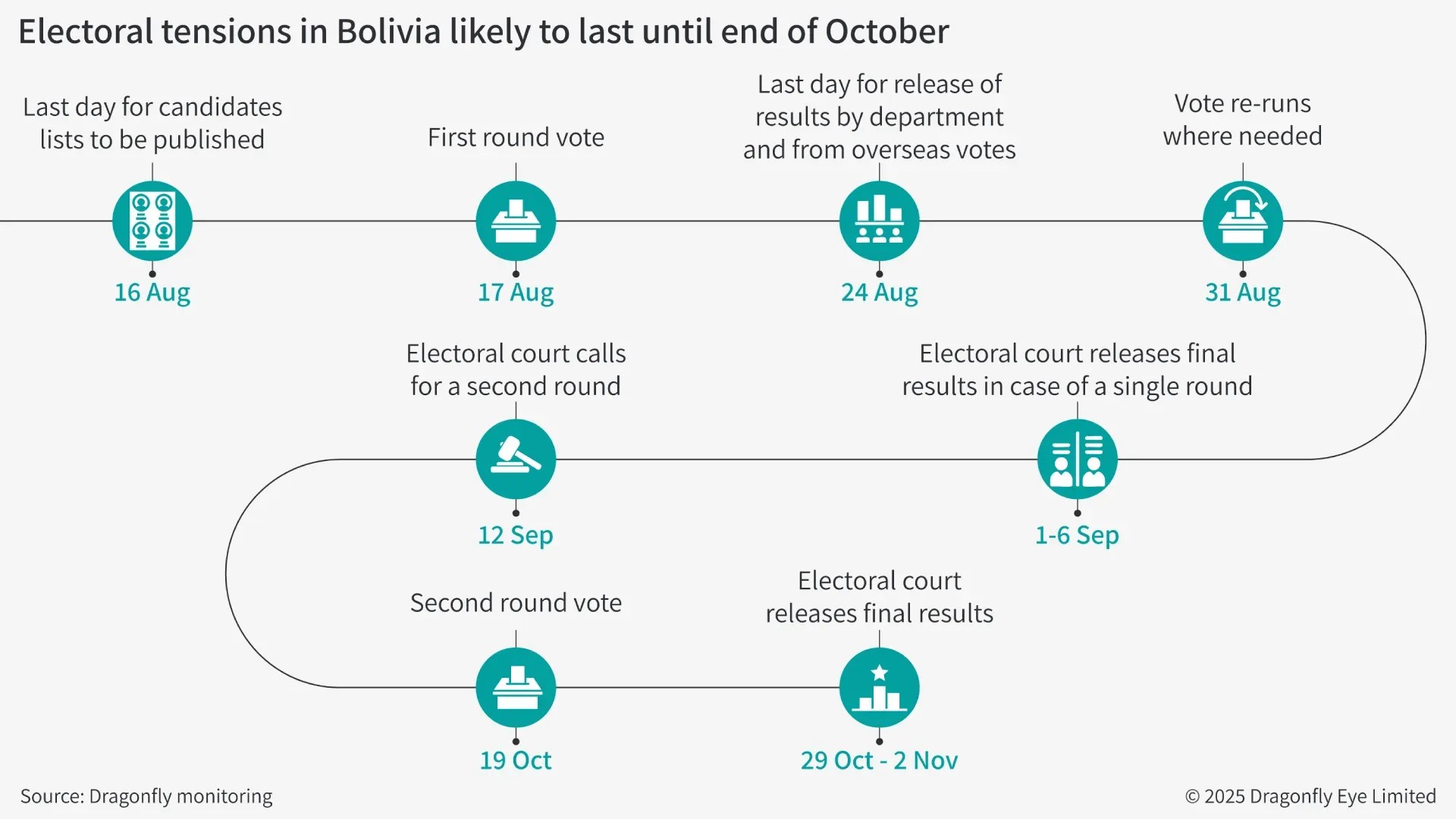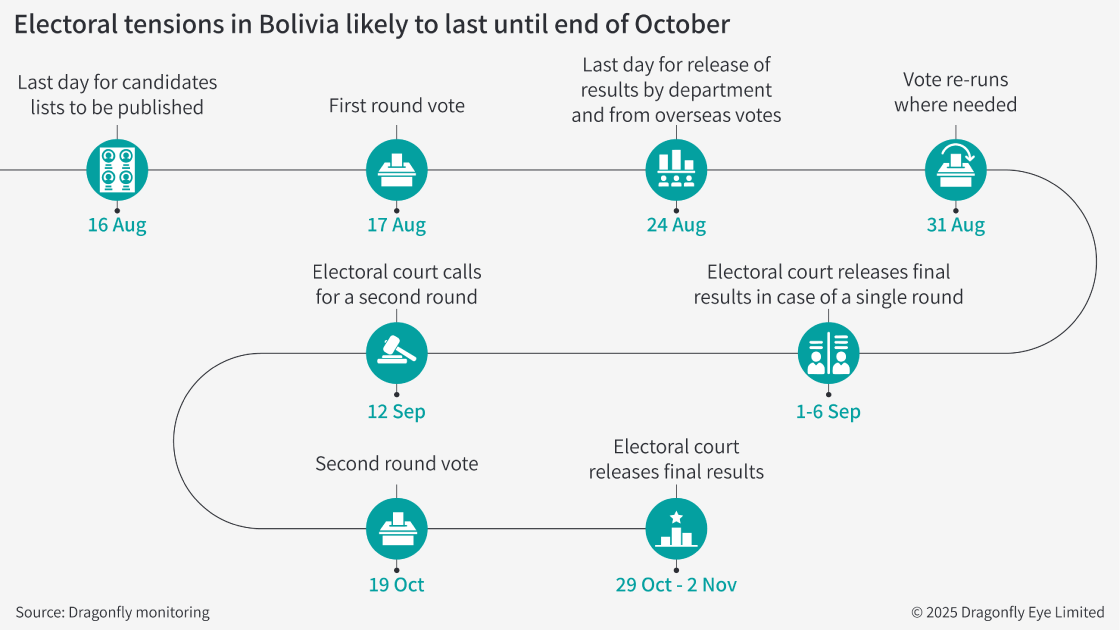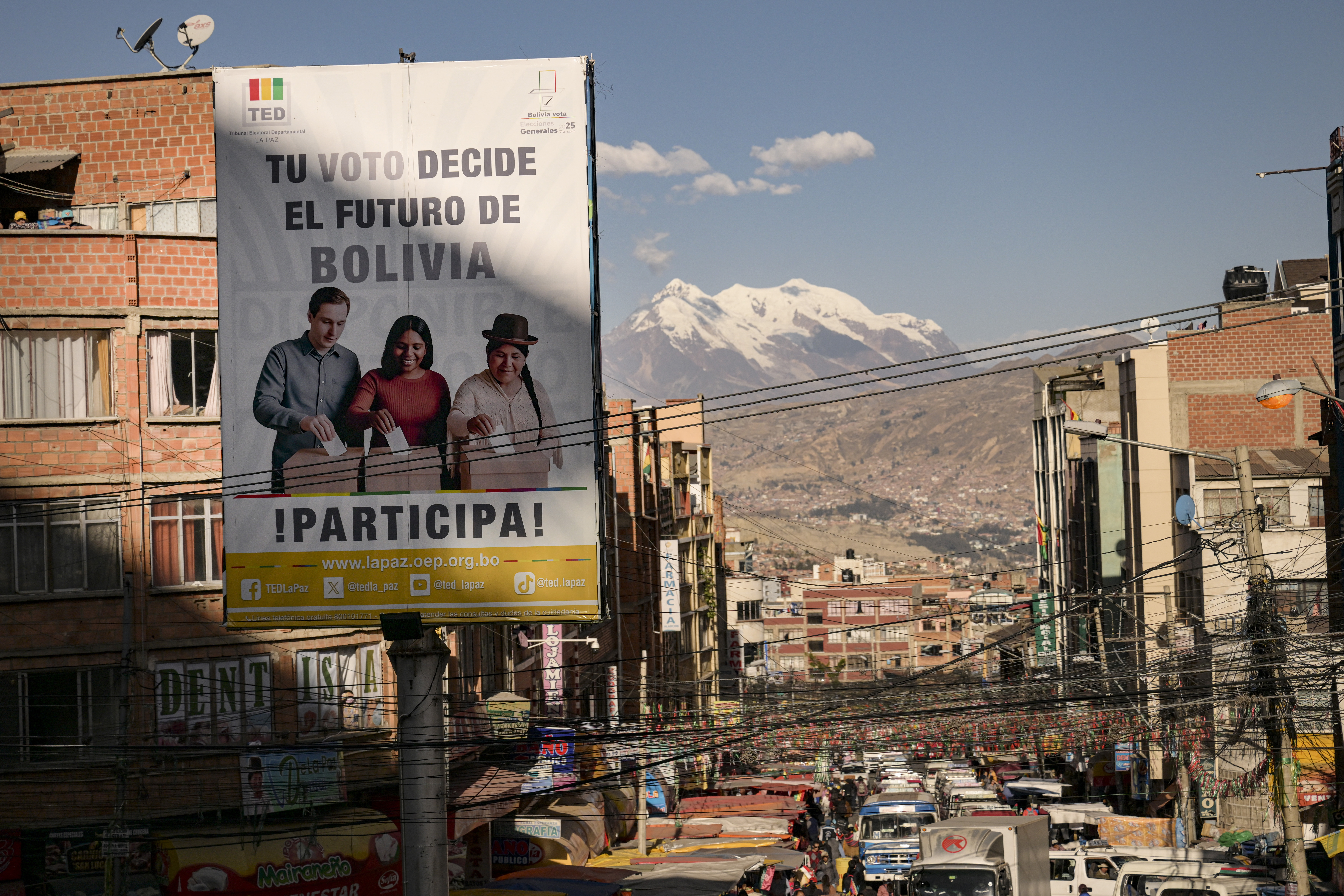
- National elections on 17 August will probably pass off peacefully, but election-related tensions will continue for the next few months as a second round in October is likely
- There is a high likelihood that former president Evo Morales will denounce the vote on 17 August as illegitimate and mobilise his supporters
- We anticipate major unrest in Cochabamba department and La Paz should Morales be arrested after the elections
We have seen no signs that widespread or violent unrest is likely to occur ahead of and during national elections on 17 August. In recent weeks, former President Evo Morales has called on his supporters to spoil their ballots as a form of protest against his being banned from running as a presidential candidate, rather than taking to the streets. Still, some protests are likely after the election, which will probably go to a second round – scheduled for 19 October – as no candidate seems likely to gain more than 50%.
Vote will probably be peaceful
We assess that the elections on 17 August are likely to pass off peacefully. There have been no disruptive actions by supporters of Morales – such as demonstrations or road blocks – since early June. On 10-11 June, five people died during clashes with police in Llallagua, Potosi department, when locals sought to end road blocks by Morales’s supporters. Since then, there has been a decline in the number of protests. And we have seen no evidence that any other group or political figure is threatening to prevent the vote from going ahead or calling for protests to disrupt the process.
There have been reports in the local press that Morales’s supporters have issued death threats to the electoral authorities. However, in our analysis of past similar threats, these appear to be mostly cases of intimidating rhetoric designed to harass officials rather than indications that they are actively seeking to derail the process through political violence. Also, we have seen no signs that supporters of Morales or any other political actors are intent on using violence against voters or the general public.
The authorities have yet to announce a specific security plan for the vote. But past elections suggest that there will be security deployments predominantly at polling stations. Usually-reliable local media outlets have also reported that there will be police deployments, particularly in areas of the country where pro-Morales activists are based.
Second round very likely in presidential race
Election-related tensions will probably continue for the next few months. This is mainly because we doubt that the presidential race will be decided in the first round on 17 August. No candidate appears likely to secure 50% of the vote or 40% with a lead of at least ten percentage points over the share of the runner-up, according to three vote intention surveys from usually-reliable pollsters.

A conservative opposition candidate seems to be on course to win the presidential election. A voting intention survey carried out on 25-27 July by the usually reliable Ipsos CIESMORI pollsters indicates that the two frontrunners, businessman Samuel Doria Medina and former President Jorge ‘Tuto’ Quiroga, have 21.5% and 19.6%, respectively. A run-off is very likely; it is scheduled for 19 October.
Heightened protest potential ahead of run-off
We have identified two main developments that could plausibly fuel large protests and potential unrest after the first round on 17 August. First, we anticipate Morales and his supporters would be likely to denounce the process as illegitimate and call for protests if the share of blank or null ballots turned out to be larger than the number of valid votes obtained by the frontrunners. In such a scenario, we anticipate large protests to take place predominantly in Cochabamba department and the capital La Paz.
Bolivia’s electoral rules do not have any provision to declare an election invalid based on the share of spoiled ballots. But Morales would most likely claim that the elections were rigged, arguing that blank and null ballots are a proxy of electoral support for him. Over the last week or so, he has been encouraging his supporters to spoil their ballots in a sign of protest. In the last three national elections held in 2014, 2019 and 2020, invalid votes accounted for between 3% and 6% of the total. According to the same voting intention polls published between June and July, between a quarter and a third of voters would spoil their ballot or are undecided.
We have seen no evidence that large-scale electoral fraud is likely. Electoral observers such as the EU and the Organisation of American States have not voiced concerns about such risks, though a local group of election observers supported by UNDP (the Alianza Observacion Ciudadana de la Democracia, OCD) has highlighted that the narrative of fraud could be used in disinformation campaigns. It did not specify who would be behind such efforts.
Morales potential arrest still main trigger for unrest
Second, we still maintain that the single main cause of widespread and violent unrest would be Morales’s arrest over allegations of statutory rape and people trafficking; the judicial authorities issued an arrest warrant for him last year. However, we assess the likelihood of the current administration of President Luis Arce enforcing the order as low. Since November, Morales has been in his stronghold in the Chapare region to avoid arrest, but the authorities have not tried to remove him from there.
Also, the frontrunners for the presidency have not explicitly said that they will enforce the arrest order. While Quiroga has not spoken much publicly about Morales so far in the campaign, Doria Medina has said he would ‘comply with the law’.
Based on the reaction of Morales’s supporters when the authorities have previously signalled their intent to arrest him, they would almost certainly engage in violent confrontations with the security forces to prevent his capture. They would probably use sticks, stones and dynamite sticks, as well as home-made incendiary devices (Molotov cocktails) and firearms. In recent months pro-Morales protests have mostly taken place in and around Chapare; but in the event of arrest, we assess that supporters from different parts of the country would probably march towards La Paz.
Sporadic protests over economic issues
Apart from election-related protests, sporadic large demonstrations over dissatisfaction with the economy seem likely in the months after the election. A public opinion poll carried out in May by local broadcaster Unitel indicates that local economic issues are the top concerns of voters, including inflation, fuel and currency shortages, and unemployment. Disruptive but largely peaceful ‘pots and pans’ protests organised by different organisations, such as merchants and transport workers, have taken place throughout the year, most recently in late May.
Both frontrunners have focused on addressing these issues by opening up the economy, boosting foreign investment, cutting public spending and privatising state firms. And even the best-placed left-wing candidate has promised to adopt austerity measures that are ‘neither neoliberal nor antisocial’ and to replace subsidies with means-tested grants. Nevertheless, if the new administration were to remove subsidies abruptly, particularly for fuel and basic foodstuffs, this would very likely lead to large and potentially violent demonstrations. Morales, in particular, would probably seek to mobilise his supporters.
A poster calling for people to vote in the presidential elections is pictured in La Paz on August 12, 2025. Bolivia will hold presidential election on August 17, 2025. (Photo by MARTIN BERNETTI / AFP via Getty Images)




